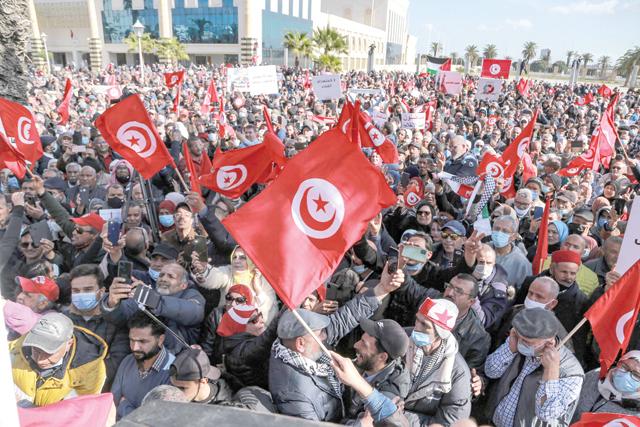You are here
Tunisian judges strike after president scraps watchdog
By AFP - Feb 09,2022 - Last updated at Feb 09,2022

Tunisian citizens and lawyers leave the court of the governorate of Ariana after the announcement of a strike of the judges on Wednesday following the dissolution of the supreme council of the Judiciary by President Saied (AFP photo)
TUNIS — Tunisian judges on Wednesday started a widely observed nationwide strike, days after President Kais Saied announced he would dissolve a key judicial watchdog.
Saied on the weekend moved to scrap the Supreme Judicial Council (CSM), accusing it of blocking politically sensitive investigations and being influenced by his nemesis, the Islamist-inspired Ennahdha Party.
His move against the CSM — after he sacked the government and froze parliament in July then moved to rule by decree — has sparked condemnation from world powers and rights groups.
Some have accused him of taking another step towards authoritarian rule in Tunisia, a country often lauded as the only democracy to emerge from the 2011 Arab revolts.
The Tunisian Magistrates’ Association (AMT) responded by urging judges across the North African nation to strike on Wednesday and Thursday.
AMT chief Anas Hamadi told AFP that at least 70 per cent of judges had adhered to the strike according to initial figures.
The Syndicate of Judges, a separate union that has called for judicial reforms, was not supporting the strike action.
An AFP journalist said no hearings were being held at the lower court in the Ariana governorate, part of greater Tunis.
Hamadi said all courts in the Manouba, Sfax and Tataouine provinces were also closed, adding that “a minority” of judges had gone to work elsewhere.
He said Saied’s decision to scrap the CSM was “a danger to the state and the judiciary, one of the key pillars of a democratic state”.
“The president of the Republic is missing every opportunity for dialogue and consultation to find solutions that could preserve the independence of the judiciary,” he added.
On Wednesday, a group of 45 civil society groups issued a statement rejecting “any interference by the executive authority in the judiciary’s work”.
They said the CSM, despite its “shortcomings”, was the only institution guaranteeing the judiciary’s independence.
Saied has insisted he has no intention of “interfering” in the justice system, saying it was “necessary” to remove a council accused of blocking investigations into the 2013 assassinations of leftist political figures Chokri Belaid and Mohamed Brahmi.
Related Articles
TUNIS — Tunisia's President Kais Saied inaugurated a "temporary" council of judges on Monday, which replaces an independent watchdog that he
TUNIS — Thousands of Tunisians protested on Sunday after President Kais Saied gave himself sweeping powers over the judiciary, his latest st
TUNIS — Tunisian police on Monday blocked access to the country's top judicial watchdog in a move its chief slammed as "illegal", two days a

















